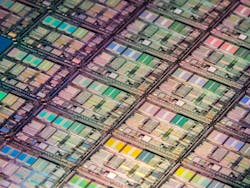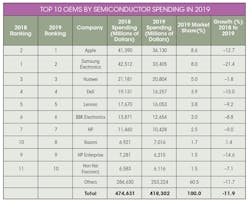Apple reclaimed its position as the top semiconductor spender last year, cementing its status as the most coveted customer in the global chip industry. The Silicon Valley giant regained its title despite the declining cost of memory chips and the uncertainty fueled by the trade war between the United States and China, according to market researcher Gartner.
The world's No.3 smartphone seller by market share, Apple accounted for 8.6% of global spending on chips. The company slashed its spending from $41.4 billion in 2018 to $36.1 billion in 2019 as the cost of memory chips crammed in its electronics eased, according to Gartner estimates. Despite global trade tensions and dull iPhone demand, Apple's sales of wearable devices, including Apple Watch and AirPods, have soared.
Apple's surge in the standings came as the semiconductor market reported its worst sales decline in decades. Global sales plunged as the uncertainty surrounding the US trade war with China made customers more cautious. Political friction in China and the EU also deflated growth in the global economy. In 2019, the top 5 semiconductor buyers reduced their spending, according to Masatsune Yamaji, principal analyst at Gartner.
Spending also slipped as the cost of memory chips declined over the last year. Prices for memory chips surged because of supply shortages in 2018, accounting for 45% of spending. But many of the world's largest memory manufacturers overproduced as the global economy weakened, leaving inventory unsold and memory prices plunging. "The top five OEMs reduced their memory spending share to 36% in 2019," Gartner said.
Samsung, the world's largest seller of smartphones, dropped to the second spot for the first time in three years. The company's spending on semiconductors slipped more than 20% over the last year as demand dipped in the high-end handset market. Samsung, also the global leader in memory ICs, reduced its total spending on chips from $42.5 billion to $33.4 billion in 2019 as it struggled to turn things around in a brutal year.
Huawei was the world's No.3 semiconductor spender last year, its position unchanged from the previous year. The company's spending slipped slightly more than 1% over the last year despite its inability to import chips and other components from the US, which has devastated its business internationally. The Chinese conglomerate, which is also No.2 in the smartphone market, cut spending from $21.2 billion to $20.8 billion in 2019.
Dell Technologies, dented by supply shortages in personal computer chips and slowing investments in data centers, slashed its spending 15% to $16.3 billion. Lenovo held onto its position by buying $16.1 billion of semiconductors in 2019, down from $17.6 billion. Hewlett Packard's spending on chips declined from $11.4 billion to $10.4 billion over the last year. Global electronic equipment sales contracted slightly in 2019, Gartner noted.
Foxconn, the world's largest electronics manufacturer, leaped onto the leaderboard with spending of $6.1 billion on semiconductors in 2019, sagging from $6.6 billion in 2018. The company is the largest manufacturer of Apple iPhones and other flagship products but its long list of customers includes Cisco, Google, Nokia and Sony. The top 10 OEMs accounted for 39.5% of global spending on silicon in 2019, down from 39.9% in 2018.
About the Author
James Morra
Senior Editor
James Morra is the senior editor for Electronic Design, covering the semiconductor industry and new technology trends, with a focus on power electronics and power management. He also reports on the business behind electrical engineering, including the electronics supply chain. He joined Electronic Design in 2015 and is based in Chicago, Illinois.


